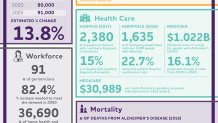A new report from the Alzheimer’s Association shows that the number of people in Connecticut who are 65 years old and up with Alzheimer’s Disease will likely increase by nearly 13% in just the next three years and it comes amid a shortage in the dementia-care workforce and widespread confusion over how to tell the difference between cognitive issues and normal aging.
A new report from the Alzheimer’s Association shows that the number of people in Connecticut who are 65 years old and up with Alzheimer’s Disease will likely increase by nearly 13% in just the next three years and it comes amid a shortage in the dementia-care workforce and widespread confusion over how to tell the difference between cognitive issues and normal aging.
There are, however, some things we can all do to try to turn that around.
Stream Connecticut News for free, 24/7, wherever you are.
Mike Davis, 79-year-old retired corporate controller from Norwalk, said Alzheimer’s runs in his family and he was diagnosed a few years ago with mild cognitive impairment, or MCI.
He said he noticed some issues a few years ago and took a gene test.
Get top local Connecticut stories delivered to you every morning with the News Headlines newsletter.
“I started having some more, I would call, significant memory lapses in the form of not remembering that I had told somebody something,” he said.
He has started working hard to fend off what might happen.
One thing he is doing is exercising, doing 60- to 90-minute workouts and 20-mile bicycle rides when it’s nice outside.
Local
In the winter, he heads into the gym six days a week.
Davis also keeps his mind active with mental exercise to keep his brain as healthy as possible.
“I play poker on here, I play Scrabble on here, I play gin rummy on here,” Davis said.
Dr. Amy Sanders, a cognitive neurologist with Hartford HealthCare, said research is starting to prove what many doctors have suspected for years -- that lifestyle choices like that that Davis is making do make a difference.
“Physical exercise increases blood flow to the brain and that makes the brain very happy,” Sanders said.
The number of people in Connecticut who are 65 and older with Alzheimer’s is expected to jump from 80,000 to 91,000 in the next three years, according to the Alzheimer’s Association.

With the increase in the number of people in Connecticut, and across the country expected to be diagnosed with Alzheimer’s or MCI in the years ahead, Sanders said the medical industry needs to address what she calls a chronic shortage of geriatricians and cognitive neurologists.
“I heard somebody quip once in a meeting that there are probably more players under active contract in the NBA than there are cognitive neurologists in the entire United States. That’s how bad the shortage is,” Sanders said.
She said the healthcare industry has to do a better job at recruiting in the area of memory disorders and offer much better pay.
Sanders said it’s important to know what’s normal and what’s not.
“Tip of the tongue phenomenon -- it’s on the tip of your tongue, and you just cannot think what it is, and that is one of the hallmark signs of normal cognitive aging,” she said.
Davis said that when memory issues started to go deeper than that, he knew it was time to address it.
“It’s one thing to say ‘What was the name of that actor that was in …’ but you know the name of the movie. ‘That was the movie XYZ.’ It’s another thing when you say ‘I can’t remember the name of the movie, but the actor who was in it, I can’t remember his name either; it was great,” he said.
Experts said it’s important not to try to self-diagnose and self-treat. People with signs of MCI should see a doctor early.
“You’ve got to take cognizance that you’re having changes and you’ve got to adapt to them. Whether it’s physical or mental,” Sanders said.



